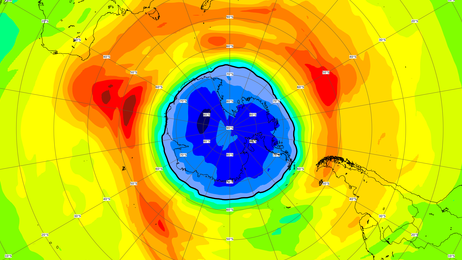
BREAKING American millionaire Jonathan Lehrer denied bail after being charged with killing Canadian couple
American millionaire Jonathan Lehrer, one of two men charged in the killings of a Canadian couple in Dominica, has been denied bail.
Scientists say the hole in the Earth's protective ozone layer over the Southern Hemisphere is larger than usual this year and already surpasses the size of Antarctica.
The European Union's Copernicus Atmosphere Monitoring Service said Thursday that the so-called ozone hole, which appears every year during the Southern Hemisphere spring, has grown considerably in the past week following an average start.
"Forecasts show that this year's hole has evolved into a rather larger than usual one," said Vincent-Henri Peuch, who heads the EU's satellite monitoring service.
"We are looking at a quite big and potentially also deep ozone hole," he said.
Atmospheric ozone absorbs ultraviolet light coming from the sun. Its absence means more of this high-energy radiation reaches the Earth, where it can harm living cells.
Peuch noted that last year's ozone hole also started out unremarkably but then turned into one of the longest-lasting ones on record.
The Montreal Protocol, signed in 1987, led to a ban on a group of chemicals called halocarbons that were blamed for exacerbating the annual ozone hole.
Experts say that while the ozone layer is beginning to recover, it's likely to take until the 2060s for the ozone-depleting substances used in refrigerants and spray cans to completely disappear from the atmosphere.

American millionaire Jonathan Lehrer, one of two men charged in the killings of a Canadian couple in Dominica, has been denied bail.
A group of suspects that allegedly defrauded seniors across Ontario and other parts of Canada using a so-called emergency grandparent scam appear to have ties to 'Italian traditional organized crime,' according to an investigator involved in the OPP-led probe.
A motion to reverse a ban on the keffiyeh within Queen’s Park failed to receive unanimous consent Thursday just moments after Ontario Premier Doug Ford reiterated his view that prohibiting the garment in the House is divisive.
Most Canadians in March reported feeling angry or pessimistic towards the federal government than at any point in the last six years, according to a survey by Nanos Research.
The Canada Border Services Agency is scrambling to find space to hold high-risk detainees that are set to be transferred from provincial jails in June.
Guitar legend Dickey Betts, who co-founded the Allman Brothers Band and wrote their biggest hit, 'Ramblin' Man,' has died. He was 80.
A Google Drive link allegedly containing 17 tracks that are purportedly from Swift's eagerly awaited "The Tortured Poets Department" album has been making the rounds on the internet in the past day and people are equal parts mad, sad and happy about it.
The journey to home ownership can be exciting, but personal finance columnist Christopher Liew warns about the trappings of becoming 'house poor' -- where an overwhelming portion of your income is devoured by housing costs. Liew offers some practical strategies to maintain better financial health while owning a home.
Calgary police say Winston Campbell, 45, has been charged in the death of a two-year-old girl in 2022.

Molly Knight, a grade four student in Nova Scotia, noticed her school library did not have many books on female athletes, so she started her own book drive in hopes of changing that.
Almost 7,000 bars of pure gold were stolen from Pearson International Airport exactly one year ago during an elaborate heist, but so far only a tiny fraction of that stolen loot has been found.
When Les Robertson was walking home from the gym in North Vancouver's Lower Lonsdale neighbourhood three weeks ago, he did a double take. Standing near a burrow it had dug in a vacant lot near East 1st Street and St. Georges Avenue was a yellow-bellied marmot.
A moulting seal who was relocated after drawing daily crowds of onlookers in Greater Victoria has made a surprise return, after what officials described as an 'astonishing' six-day journey.
Just steps from Parliament Hill is a barber shop that for the last 100 years has catered to everyone from prime ministers to tourists.
A high score on a Foo Fighters pinball machine has Edmonton player Dave Formenti on a high.
A compound used to treat sour gas that's been linked to fertility issues in cattle has been found throughout groundwater in the Prairies, according to a new study.
While many people choose to keep their medical appointments private, four longtime friends decided to undergo vasectomies as a group in B.C.'s Lower Mainland.
A popular highway in Alberta's Banff National Park now has a 'no stopping zone' to help protect two bears.
 A map of the ozone hole over the South Pole. (Copernicus Atmosphere Monitoring Service)
A map of the ozone hole over the South Pole. (Copernicus Atmosphere Monitoring Service)